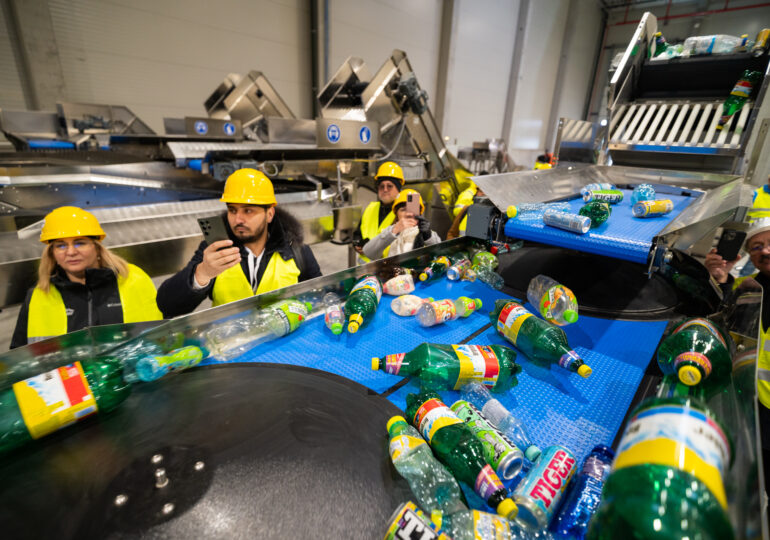In the Transylvanian village of Pianu de Jos, 51-year-old Dana Chitucescu collects a bag of empty plastic bottles, aluminum cans, and glass bottles every week and takes it to the local store.
Like millions of Romanians in cities and rural areas, Chitucescu has incorporated the deposit-return system (DRS) into her routine, launched two years ago.
It's a simple scheme: when buying soft drinks or alcoholic beverages, the customer pays an extra 0.50 lei per bottle and gets the money back when returning the packaging, cleaned and in its original form, to a collection point (usually the same stores where the products were purchased), writes The Guardian in an extensive piece about our Deposit-Return System (DRS).
Chitucescu earns about 40 lei per week from recycling her bottles and those of another family. "The money covers the food for my seven cats," she said. "It's a great system, everyone in our village uses it, there's always a queue at the store."
Romania's recycling rates have been among the lowest in the EU, but in the two years since the scheme was launched, the collection and recycling of beverage packaging have skyrocketed to 94% in some months.
"It's a success story," said Gemma Webb, the CEO of RetuRO, the company managing the system in a public-private partnership with beverage packaging producers and the Romanian state.
Romanians have returned approximately 7.5 billion beverage containers since the system's launch, between November 2023 and the end of September 2025, according to the company. Among the returned packaging were 4 billion PET bottles, 2 billion metal cans, and 1.5 billion glass containers. Over 500,000 tons of high-quality recyclable materials have been collected. "We are the largest fully integrated return system globally," the company specified.
More than a decade at the bottom of the recycling ranking
For over a decade, Romania has been at the bottom of the recycling statistics in Europe. Between 2011 and 2021, the country's municipal waste recycling rate decreased, fluctuating between 11% and 14%, while it increased in the rest of the EU.
However, in 2018, the Government started discussions about the scheme. In 2022, RetuRO began work, and with an extremely tight schedule, including the construction of nine national counting and sorting centers, the scheme was launched at the end of 2023.
"We now have one of the largest and most complex logistics networks in Romania," Webb stated.
In fact, starting later than in other countries is an advantage, says Raul Pop, Secretary of State in the Ministry of Environment and waste policy expert, as Romania could use modern software and traceability tools.
It's about a retail return model: stores selling the containers must either install reverse vending machines or process the packaging manually. There is also a financial incentive for them, helping cover processing costs, and RetuRO reinvests all profits into operations.
A recent study found that 90% of Romanians say they have used the system at least once, and 60% regularly return the packaging.
Other countries want to learn from Romania
Other countries, explained Pop, "suffer from their own inertia," as they introduced their systems decades ago and are now stuck with outdated models. For them, transitioning to new systems risks confusing consumers, even though it could improve collection rates.
Countries like Poland, Turkey, Bulgaria, Moldova, and Serbia have had meetings with RetuRO and Romanian authorities, wanting to learn best practices as they prepare to implement a similar system.
Romania has also introduced a supportive legal framework, meaning that retailers can be penalized if they refuse returns - even the smallest village shops must accept containers if they sell the products or risk fines, while large chains have automated return points.
After the success with beverage containers, there are plans to expand the system to cover other types of packaging. "If you can put a water bottle, you can put a vinegar bottle, a jar, or a milk carton," said Alexandra Țuțuianu from Ecoteca, Romania's first NGO specialized in waste management.
The waste problem is not solved
Environmental groups have praised Romania's recycling system, but warn that it covers only a small part of the country's total waste flow. "It's the largest environmental program, a good practice example, we praise it, we really like the system, but it's not enough, it doesn't solve Romania's waste problem," said Țuțuianu.
Beverage packaging accounts for only 5% of the total waste generated in Romania. According to Eurostat, the country had a total recycling rate of only 12% in 2024 and never exceeded 14%. Even with a hypothetical 100% return rate for beverage containers, the overall waste recycling rate would increase only marginally.
For now, while Romania has become a model of public policy abroad, for Chitucescu, success is not measured in billions of bottles but in what she no longer sees in her community.
When it rains heavily, bottles are no longer thrown in the streams. When walking through the village, the streets are no longer full of garbage.
Her brother, who lives in Spain, is envious. He says they don't have a similar system and that it's one of the few things Romania does exceptionally well.
"He's jealous of us, and he's right, it's beneficial for us and the environment," said Chitucescu.

